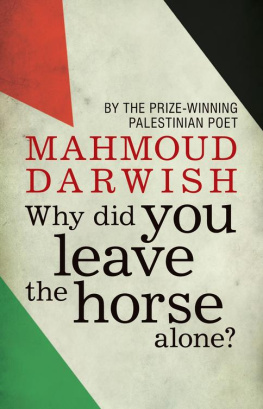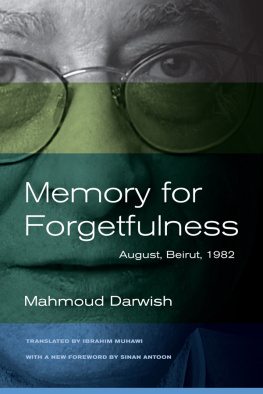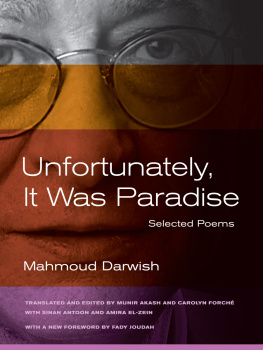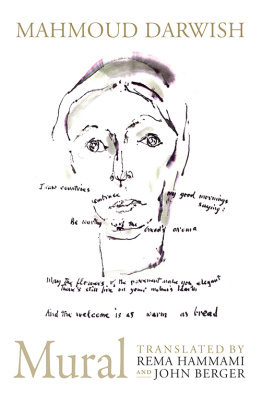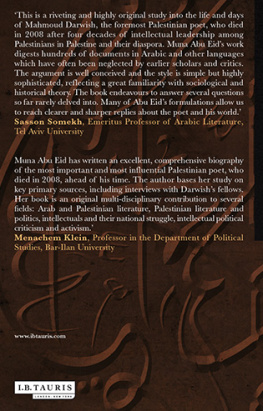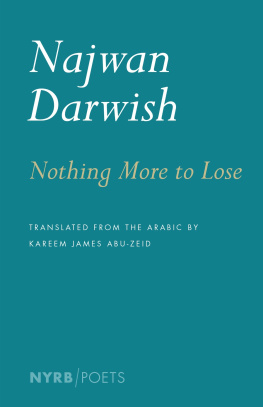On a visit to Mahmoud Darwish at his flat in Amman I carried with me a small tape recorder with the intention of recording him reading two poems: How Many Times Shall Things Be Over? and To My End and to Its End. Mahmoud was courteous enough to acquiesce to my demand, which I had thought perhaps too much to ask, simply because he used to recite his poetry before a large audience (sometimes thousands) and at a spacious place! The first poem expresses the sense of betrayal caused by the agents of the 1948 war, which consequently forced the poet and his family to leave their home and take shelter in the neighbouring country, Lebanon. Mahmoud renders his fathers recollection of the experience not in tranquility but from the most upsetting situation in which he and his family suddenly found themselves caught. It was a harsh summer for the Darwish family to live as refugees in Lebanon, scanning their eyes across the border to their deserted home with the horse left alone and ripe crops of the summer season left uncollected for the first time. The other poem is an account of the horrible trip they decided to take back during the night, stealing across the borders towards their home. The trip is obviously very dangerous, as it would cost them their life if they were spotted by the border police, but luckily they made it.
On various occasions later in life, Mahmoud declared that the experience of crossing the borders on foot in the heart of darkness had been deeply carved in his memory. The title of this volume is derived from this experience of interpersonality included in the two poems mentioned above. Listening to Mahmoud Darwish reciting the two poems one might assume that the poems were written by the six-year-old child rather than by the mature poet, for the eloquence of the poems makes you visualize the event of lyricism as evidence rather than lyricism contrived in abstract by words. In Pounds comment on poetry and poets (in a letter to Kate Buss 9th March 1916) The poem is not so much the expression of a lyrical state as evidence for such a state. The poet is out to avoid at all costs the poetry that is an asylum for [the] affections. In Age of Iron Coetze similarly tells us that the purpose of his narrative is not to solicit pity but to help us see things as they happen.
Mahmoud Darwishs poetry falls into the realm of this kind of objectivity, presumably articulated by Eliots objective correlative. After I had translated the two poems into English, I showed them to Mahmoud. It seemed he had just received a translation of Why Did You Leave the Horse Alone? His response was: the horse left alone has not been fortunate enough to receive a translation I favour, despite the fact that it is my most favourable collection of poetry. He continued to say that he was not even sent a proof copy to read! I was not in a position to make any comment, simply because I did not know the edition he was talking about, not having seen the translation to which he was referring. In the course of our conversation he suggested that I could try to translate the volume in question, and I considered the offer a privilege, adding to the previous privilege I had of translating Almond Blossoms and Beyond and Absent Presence. * * * Here I am then, with this translation created as a homage to Mahmoud Darwish, rather than as an attempt to be an improvement on any other translation available. * * * Here I am then, with this translation created as a homage to Mahmoud Darwish, rather than as an attempt to be an improvement on any other translation available.
Needless to say that all translations are defective in one way or another. The redeeming feature of any new translation is that it forms an open invitation for a further different translation advanced to the reader. It may be worthwhile remembering that Mahmoud Darwish was never keen on having his poetry translated and he simply prided himself on writing in Arabic with no eye on a non-Arab reader. Once he was asked whether he would like to read his poetry in translation before an audience who didnt know Arabic. His answer was I only read my own poetry. Somehow Mahmoud felt that reciting his poetry in translation himself would be an act of betrayal to the identity of his poetry.
In March 2008 Mariam, Edward Saids widow, came to Amman bearing a message for Mahmoud from the organizing committee of the annual lecture in memory of Said. Mahmoud was happy to accept the invitation (Mahmoud and Edward were good friends) and to read the obituary poem he had written in Arabic (titled Counterpoint) on that sad occasion in 2003. When Mariam Said suggested to him that he might be asked to recite the poem in English he turned to me and said that it ought to be read by the translator (the poem is included in Almond Blossoms and Beyond). Ironically Mahmoud had to go to Houston to have his voice silenced instead of going to New York to make his voice heard in recital of Counterpoint (the other title of the poem is Contrapuntal: a term Said favoured). The poem itself with the two versions of the title is ironical. There is consolation, however, in Roland Barthess most popular The Death of the Author theory with its implication that texts in all languages survive their author.
No doubt Mahmouds poetry will survive the poets death and challenge time and place. On a visit to his family, Mahmoud was asked by his fellow-Palestinians living in Galilee to recite Identity Card, a very popular poem he wrote relatively early in his life which has become almost a national anthem not only for Palestinians, but also for Arabs as well. His answer was that the poem was written to address a different audience! Yet the other reason for avoiding reciting that poem in public (and I heard him turn down the same offer on various occasions) was his desire to draw the attention of the public to the fact that his poetry developed a great deal after writing that poem. The straightforward impact on his Arab audience in particular made some people identify Mahmoud Darwish with that poem, as if he were to become the poet of The Identity Card. While Mahmoud Darwish had no objection to any translation found reasonably satisfactory, a translation falling short of his expectation would make him outraged. I never wanted to express my views about the translations of his poetry already submitted to him and then passed over to me afterwards, as I believed that any translation, whatever its limitations, is in itself a good gesture and it can probably help in widening the circle of his readership.
I kept some of those rejected translations and I still remember how some of them provoked his deep anger. The several sessions held together at his flat to discuss my translation of Almond Blossoms and Beyond and Absent Presence assured me of Mahmouds remarkable command of language and his profound sense of literary judgement. In the long discussions we had, Mahmoud demonstrated particular appreciation for the task of translation. He never insisted on advancing what he believed to be a better or best alternative to the translation made available to him. On one occasion I complained to him about a poem included in Almond Blossoms and Beyond. The poem is Tuesday, A Bright Day where I was unable to identify the person affectionately celebrated in the poem.
His immediate response was that he should have done something to make it less ambiguous. He even went as far as suggesting adding some clue to the poem to make it more intelligible! The poet in question turned out to be Nizar Qabbani. Mahmoud Darwish was seriously engaged in Arabic tradition: classical and modern; from Al-Mutanabbi (his guru) to Nizar Qabbani. Besides this, he was well-versed in European modernism and postmodernism; and this perhaps gave his poetry a complex structure of feeling, which the reader and translator both find taxing. What Mahmoud Darwish would have liked to say to his people and to others, beside his response to their invitation to read The Identity Card, is that he had travelled with his poetry beyond the borders. All great poetry travels, to borrow Edward Saids popular title of Theory Travels, and it travels in a finer tone to help it survive freely in exile instead of finding shelter in asylum.

